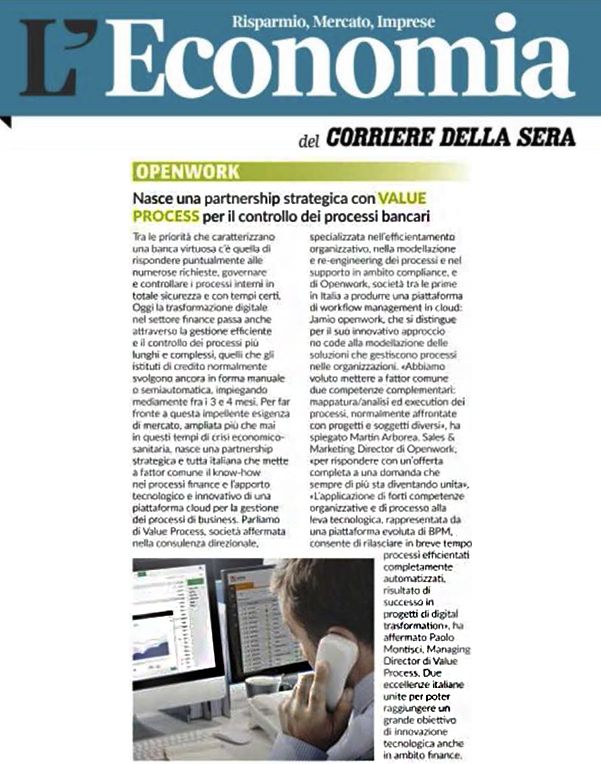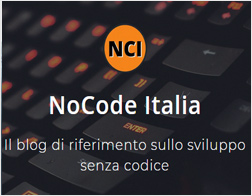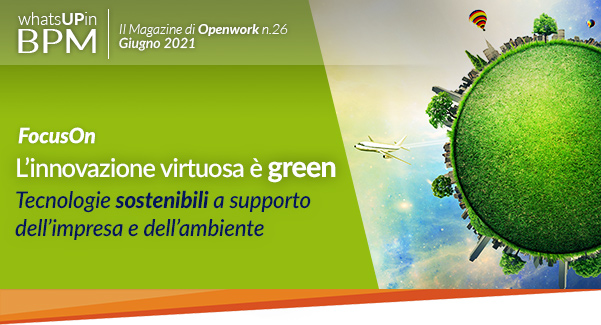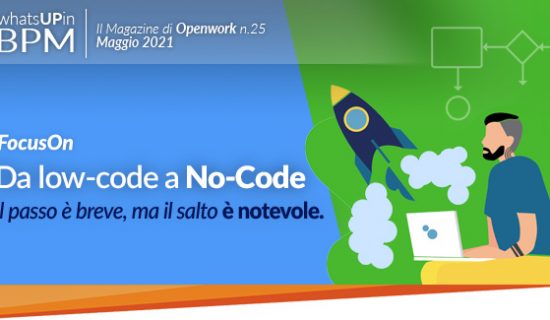
Editorial by:
Ivan Giuliani
Marketing & Digital Coordinator Openwork
The theme of sustainable development is becoming increasingly relevant in every business activity all the more so in the innovation of business models flowing into digital.
As industry has evolved, in fact, the need to produce goods and services on a large scale, coupled with the desire for growth and wealth, have endangered our planet's natural resources, air quality and respect for the environment, all of which are also, and especially, threatened by the phenomenon of globalization.
In this delicate as well as dramatic historical period, the strategic choices made by companies can prove crucial to the survival of our ecosystem. This is well known by the 26 European countries that unanimously signed recently "A Green and Digital Transformation of the EU" , a declaration aimed at accelerating and spreading the use of green digital technologies for the benefit of the environment, a framework in which 26 among CEOs and presidents have agreed to commit on behalf of their respectiveICT companies to drastically reduce carbon emissions by 2030; it is an alliance dubbed "European Green Digital Coalition" in which the likes of Microsoft, Ericsson, SAP, Aruba, Vodafone Group and many others stand out.
Premises, these, that follow up on some of the 17 themes already addressed in Agenda 2030, that is, the plan of action for the planet, people and prosperity signed in 2015 by the governments of the 193 UN countries and aimed, precisely, at sustainable development; in this regard, there are several companies and multinationals that in recent years are developing initiatives to safeguard the health of the planet, as well as the future of the next generations thanks to important and ambitious sustainability programs, yet to significantly reduce pollution and the exploitation of non-renewable energy, it is necessary for each company, whether small or large, to make a commitment to the protection of the environment in which it is established.
For example, the digital transformation of companies, much driven and desired especially in the last decade, has led to the emergence and evolution of a number of technologies that respond in an exemplary way to environmental sustainability by making concrete the possibility of being able to initiate, almost jointly and globally, important forms of innovations that on the one hand increase the proactivity and productivity of companies and on the other wink at the environment; in a simple word, innovation goes green.
It is fundamentally a virtuous form of innovation that enables organizations to be able to take advantage of digital services on a daily basis without them adversely affecting the earth's natural resources with energy surpluses or polluting emissions, with the opportunity, therefore, to enable the company to be an exemplary model for society and businesses of the future.
The digitization and automation of processes, a much touted topic especially at the enterprise level, is an example of a need to which correspond technologies that can perfectly marry both the logic of the company and the principles of eco-sustainability, restoring competitiveness to the enterprise and some breath to the planet's natural resources.We are talking about Business Process Management cloud technologies : designed to manage and automate business processes, they enable large organizations to achieve a digital transformation that is effective for business and simultaneously sustainable for the environment.
Notwithstanding the fact that the digitization of businesses already in itself entails a drastic reduction in the exploitation of valuable resources (such as deforestation for paper production) the use of specific cloud technologies can originate a multitude of other benefits for the purposes of environmental sustainability.
In fact, according to an independent study by the Lawrence Berkeley National Laboratory, the use of a cloud system reduces the energy consumption of information technologies by 87 percent; in this regard, we can only count the example of Azure, Microsoft 's cloud infrastructure that uses renewable energy while keeping its performance intact and reducing its impacts on the environment through effective and efficient equipment.
This is an aspect that should not be underestimated since those of the energy consumption of classic data centers and the consequent polluting emissions are topics that have been known and detected for a long time, as demonstrated as early as 2017 by the European Commission when, analyzing the IT sector, it observed that Internet Data Centers came to generate up to 2% of global CO2 emissions.

Another point in favor of cloud technologies undoubtedly concerns the possibility of enabling companies' employees in the now proven smart working, as well as a further decrease in CO2 emissions due to the drastic reduction in car travel; an added value also documented by the study of the Smart Working Observatory of the Politecnico di Milano, which showed that each employee who worked remotely an average of 2.7 days a week (in the year of the pandemic) individually saved 1.861 kg CO2 in carbon emissions.
Even the simple use of PEC paddles in favor of the environment. In fact, a report by IDC, sponsored by Aruba, InfoCert and Trust Technologies noted how even the use of Certified Electronic Mail saved about 78,000 tons of CO2 already in 2019 alone, as well as avoiding the travel of citizens by about 253 million kilometers.
In light of this promising and interesting data, the question is: Is there a cloud platform that can manage the entire enterprise ecosystem of data, documents, processes and communications without burdening the environment?
One of the platforms that perfectly meets the above-mentioned requirements could be Jamio, the business process management cloud technology that enables the enterprise to transform itself into a virtuous and exemplary company not only because of the benefits generated by digitization but also because the organization, in the performance of its functions, does not generate negative impacts in the atmosphere thanks to Microsoft Azure, the cloud on which Jamio rests its foundation and which, by using renewable energy sources, reduces consumption and pollutants in the air.
4, thus, the values triggered by the platform to benefit the environment:
1) Saving energy
2) Containing the use of non-renewable natural resources
3) Reducing pollutant emissions
4) Saving paper and preserving trees and nature
Four good reasons to choose Jamio and that, combined withbusiness process automation, can transform an organization into a more productive, innovative and competitive company-the right mix to meet the challenges of the future with intelligence and a dash of generosity.
So, the premises and solutions to innovate in an environmentally friendly way are there and have begun to spread far and wide, but now it is up to each company to seize these opportunities to grow its business with an eye toward the health of our planet.
Will this be the real innovation challenge?

Editorial by:
Ivan Giuliani
Marketing & Digital Coordinator Openwork
Openwork & Value Process in the Corriere della Sera weekly newspaper.
The press release

For operational efficiency and secure banking process governance, a strategic, all-Italian partnership between Value Process and Openwork is born
Among the priorities that characterize a virtuous bank is to respond on time to the many requests, govern and control internal processes with total confidence and with certainty of time.
Today, digital transformation in the finance sector, also involves the efficient management and control of the most time-consuming and complex processes, those that lending institutions normally still carry out manually or semi-automatically, taking on average between 3 and 4 months.
To address this pressing market need, expanded more than ever in these times of economic-health crisis, a strategic, all-Italian partnership is born that brings together know-how in finance processes and the technological and innovative input of a cloud platform for business process management.
We are talking about Value Process-an established management consulting firm specializing in organizational efficiency, process modeling and re-engineering, and compliance support, -and Openwork, a company among the first in Italy to produce a cloud-based workflow management platform: Jamio openwork, which stands out for its innovative "no-code" approach to modeling solutions that manage processes in organizations.
"We wanted to combine two complementary skills: mapping/analysis and process execution, normally addressed with different projects and subjects," explained Martin Arborea, Sales & Marketing Director of Openwork, " to respond with a single offering to a demand that is increasingly becoming united.
"Applying strong organizational and process skills to the technological lever, represented by an evolved BPM platform," explained Paolo Montisci, managing director of Value Process, "enables the release of fully automated efficient processes, a successful outcome in digital transformation projects, in a short time.
Italian excellence united in order to achieve a major goal of technological innovation in finance as well.

Jamio and the no-code development community

Openwork is constantly working to promote the values of business innovation and sustainability, including by being close to its community, bringing its innovative no-code approach.
Visit the board of Jamio at NoCode Italy, the reference point in Italy on the world of code-free development.
jTECH | Application development through Jamio
Define a deadline for processing a document using scheduling

Let's learn how to set a deadline for processing a document associated with a master sheet through a sample Jamioware called: ManageSchedules
Such Jamioware allows one and only one pre-expiration, expiration and postexpiration schedule to be defined on each document in order to:
- monitor the last date on which to process the document;
- act promptly so as to get the document up-to-date.
Not only that, we can pause a schedule or alternatively delete a pre-existing one.
To achieve this we learn how to invoke and use the methods of the core Jamio Schedule service.








